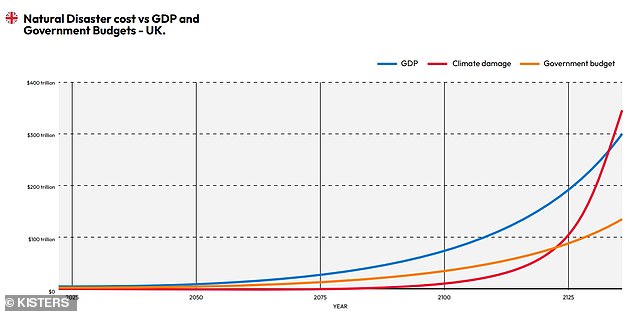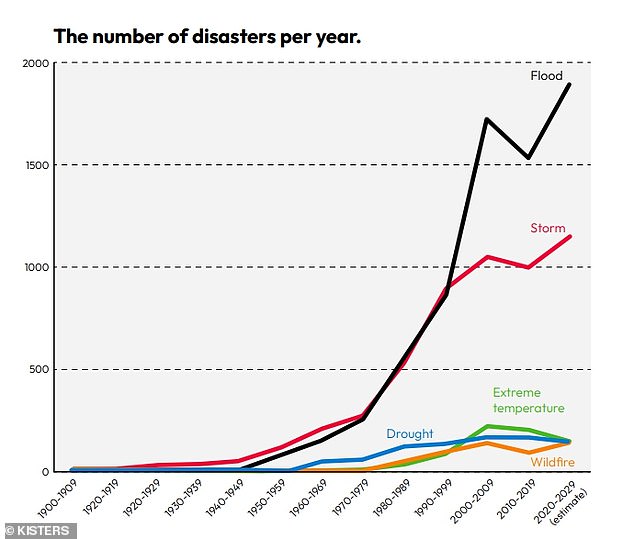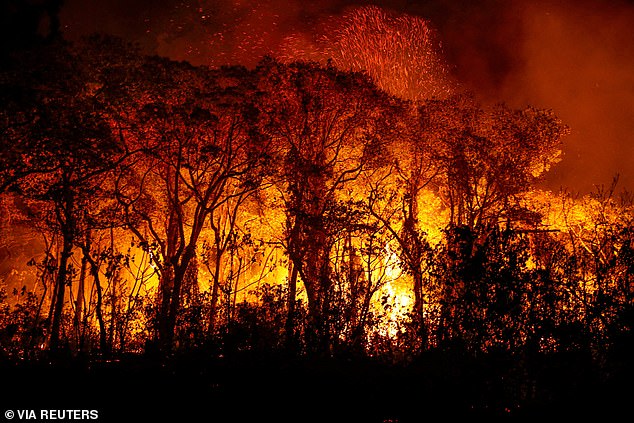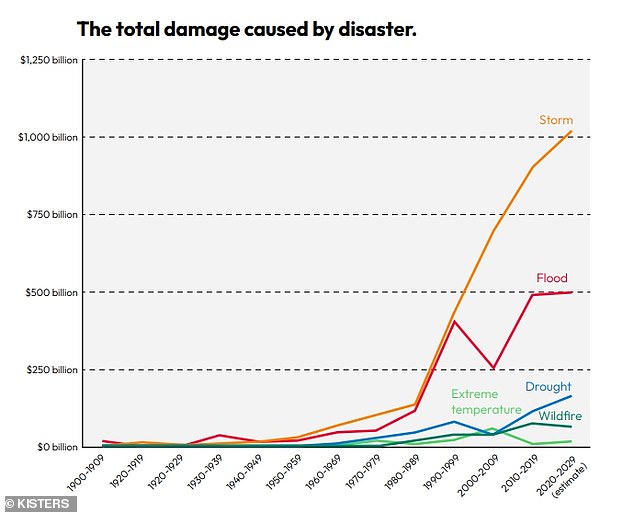The real cost of climate change: Britain will be BANKRUPT by natural disasters in just 110 years, study claims
>
A new study claims that Britain will be bankrupt due to natural disasters in just 100 years.
Researchers estimate that the annual growth in costs related to such disasters is about 11.2 percent.
This is thanks in part to how climate change is increasing the intensity of weather-related phenomena, according to experts at KISTERS.
However, UK GDP growth is currently 4.1 percent.
This means that if the current trend continues, the cost of natural disasters will exceed what the government can afford by 2134.
A new study claims that Britain will be bankrupt due to natural disasters in just 100 years. Pictured: Waves crashing at Folkestone during Storm Ciaran in November

Researchers estimate that the annual growth in costs related to such disasters is about 11.2 percent. However, UK GDP growth is currently 4.1 percent. This means that if the current trend continues, the cost of natural disasters will exceed what the government can afford by 2134
The alarming estimates were detailed in a report by KISTERS, a company specializing in environmental monitoring and data management.
The company’s research suggests that floods will be the costliest natural disaster the UK will face – including up to £33.9 billion in the next decade alone.
Between 2010 and 2019, floods cost Britain around £6.3 billion in damage.
GDP, a measure of all the activities of businesses, governments and individuals in a country, is used to help judge how well or poorly an economy is performing.
“With climate change escalating at an alarming rate, the results of this study are deeply worrying but not entirely unexpected,” said Johan Jacques, a senior meteorologist at KISTERS.

The report reveals that since 1900, 12,449 natural disasters have occurred around the world, including droughts, floods, wildfires, storms and extreme temperatures.

Since the beginning of the 20th century, the Kesters Report indicates that the average cost of natural disasters worldwide has doubled every decade. Pictured: Smoke from the fire billows into the air as trees burn in the Pantanal, the world’s largest wetland, Porto Joffre, Brazil on November 16
“We see a dangerous trajectory as the costs of natural disasters, largely fueled by climate change, significantly outpace economic growth.
“The astonishing rate of growth in the costs of natural disasters, especially in developed countries such as the UK, should serve as a wake-up call.
“Understanding that climate change is not just an environmental issue is critical. It is also an economic issue.
KISTERS has prepared a report on the cost of natural disasters versus GDP growth by country with the help of data provided by the International Disaster Database.
It reveals that since 1900, 12,449 natural disasters have occurred around the world, including droughts, floods, wildfires, storms and extreme temperatures.
The report claims that all events combined cost the global economy more than £4.1 trillion in damage.
This may seem an amazing number in itself, but it is nothing compared to what the cost could rise to over the next hundred years.

The report claims that all events combined cost the global economy more than £4.1 trillion in damage
Since the beginning of the 20th century, the Kesters Report indicates that the average cost of natural disasters worldwide has doubled every decade.
In fact, from 1990 to 2019 alone, experts say it has cost the UK nearly £1.1 billion a year, with an annual growth rate of 11.2 per cent.
This would far exceed the country’s current GDP growth of 4.1 percent.
“One of the key takeaways from this study is the importance of investing in climate resilience and adaptation strategies,” Mr. Jack added.
“It is not only about reducing greenhouse gas emissions, which is undeniably critical, but also about strengthening our infrastructure, building flood defences, and developing early warning systems.
Such investments may seem large now, but they are insignificant compared to the potential costs of inaction.
It is also important to address the misconception that climate change will primarily affect developing countries.
“Although already vulnerable, this study underscores that developed countries are not immune to the financial devastation that climate change can wreak.
“It is a global issue that requires a coordinated international response.”
(tags for translation)dailymail
